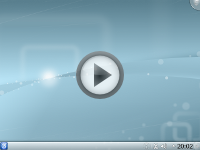Plasma/HowTo/4.5/ro: Difference between revisions
Created page with "Plasma/HowTo/4.5" |
Created page with "{{Info|Informaţia prezentată aici se referă la Plasma Desktop 4.5. <br /> Versiuni disponibile: 4.3 - [[Special:myLanguage/Plasma/HowTo..." |
||
| Line 1: | Line 1: | ||
<languages /> | <languages /> | ||
{{Info| | {{Info|Informaţia prezentată aici se referă la Plasma Desktop 4.5. <br /> | ||
Versiuni disponibile: [[Special:myLanguage/Plasma/HowTo/4.3|4.3]] - [[Special:myLanguage/Plasma/HowTo/4.4|4.4]] - '''4.5'''}} | |||
'''The Plasma Workspace''' is one of the key technologies of KDE SC 4.x (also known as the "Pillars of KDE"), and one of the most visible to users. As Plasma Desktop treats the user interface differently than a traditional desktop, there may be confusion as to what the Plasma Desktop is, what it does, and how to perform common tasks. | '''The Plasma Workspace''' is one of the key technologies of KDE SC 4.x (also known as the "Pillars of KDE"), and one of the most visible to users. As Plasma Desktop treats the user interface differently than a traditional desktop, there may be confusion as to what the Plasma Desktop is, what it does, and how to perform common tasks. | ||
Revision as of 07:50, 25 December 2010
The Plasma Workspace is one of the key technologies of KDE SC 4.x (also known as the "Pillars of KDE"), and one of the most visible to users. As Plasma Desktop treats the user interface differently than a traditional desktop, there may be confusion as to what the Plasma Desktop is, what it does, and how to perform common tasks.
The purpose of this document is to show how to perform common tasks in Plasma Desktop. Each HowTo consists of one topic and a short animation, which is reached by clicking on the link.
The animations are encoded in the GIF format and can thus be viewed in most modern web browsers without any additional plugins installed. Note that the animations are looped.
HowTo
Widgets
Desktop Widgets
- Configure widget
- Move widget
- Resize widget
- Rotate widget
- Remove widget
- Drag widget from desktop to panel
Panel Widgets
- Configure widget
- Move widget
- Remove widget
- Add spacer [1]
- Resize spacer
- Drag widget from panel to desktop
Icons
- Add icon widget to desktop
- Add icon widget to panel
- Add icon to Folder View widget [2]
- Add icon to traditional desktop [3]
- Add icon to Quicklaunch widget [4]
Desktop
Panel
- Change panel height
- Change panel width [5]
- Move panel
- Change panel alignment
- Make panel autohide
- Add new empty panel
- Add new default panel
- Remove panel
Extenders
Activities
- Add new activity [6]
- Switch activities
- Rename activity
- Change activity icon [7]
- Pause activity
- Resume activity
- Remove activity
- Link activities to virtual desktops
- Use separate activity for dashboard
Further information
For reuse
To link to an animation from another UserBase article, a thumbnail can be posted. Here's an example:
The code to do that is
{|
|[[File:Plasma_howto-thumbnail-45.png|link=Media:Plasma_howto-widget-unlock-45.gif]]
|-
|align="center"|How to unlock your widgets
|}
The animations can also be used outside of UserBase. The BBCode (used in most forums) to post a linked thumbnail is:
[url=GIF][img]http://userbase.kde.org/images.userbase/d/df/Plasma_howto-thumbnail-45.png[/img][/url]
Replace GIF with the URL to the GIF file. The corresponding HTML code is:
<a href="GIF"><img src="http://userbase.kde.org/images.userbase/d/df/Plasma_howto-thumbnail-45.png" /></a>
A description of how to record animated GIF files can be found here. Do you want to help out with making animations? See the Talk page to find out how!
- ↑ The spacer behaves like other panel widgets with the exception that it can be resized
- ↑ Requires the Folder View widget
- ↑ Requires desktop type to be set as Folder View, see Change to traditional desktop
- ↑ Requires the Quicklaunch widget
- ↑ See How can I change the height and the size of the panel? for more information.
- ↑ The list shows different desktop types, "Desktop" is a default desktop
- ↑ Requires Nepomuk Semantic Desktop enabled ("Desktop Search" in System Settings)



